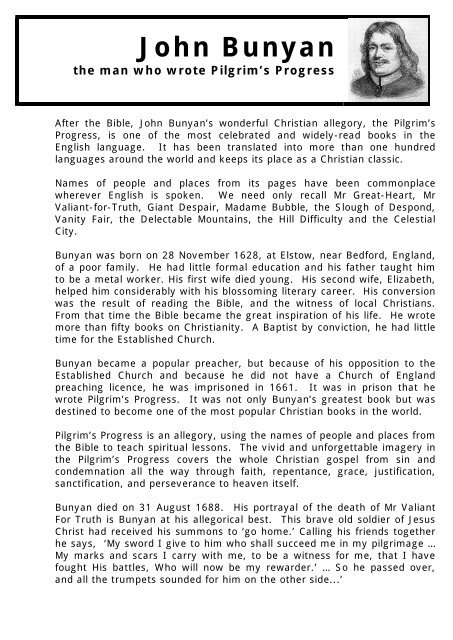August18
You also want an ePaper? Increase the reach of your titles
YUMPU automatically turns print PDFs into web optimized ePapers that Google loves.
John Bunyan<br />
the man who wrote Pilgrim’s Progress<br />
After the Bible, John Bunyan’s wonderful Christian allegory, the Pilgrim’s<br />
Progress, is one of the most celebrated and widely-read books in the<br />
English language. It has been translated into more than one hundred<br />
languages around the world and keeps its place as a Christian classic.<br />
Names of people and places from its pages have been commonplace<br />
wherever English is spoken. We need only recall Mr Great-Heart, Mr<br />
Valiant-for-Truth, Giant Despair, Madame Bubble, the Slough of Despond,<br />
Vanity Fair, the Delectable Mountains, the Hill Difficulty and the Celestial<br />
City.<br />
Bunyan was born on 28 November 1628, at Elstow, near Bedford, England,<br />
of a poor family. He had little formal education and his father taught him<br />
to be a metal worker. His first wife died young. His second wife, Elizabeth,<br />
helped him considerably with his blossoming literary career. His conversion<br />
was the result of reading the Bible, and the witness of local Christians.<br />
From that time the Bible became the great inspiration of his life. He wrote<br />
more than fifty books on Christianity. A Baptist by conviction, he had little<br />
time for the Established Church.<br />
Bunyan became a popular preacher, but because of his opposition to the<br />
Established Church and because he did not have a Church of England<br />
preaching licence, he was imprisoned in 1661. It was in prison that he<br />
wrote Pilgrim’s Progress. It was not only Bunyan’s greatest book but was<br />
destined to become one of the most popular Christian books in the world.<br />
Pilgrim’s Progress is an allegory, using the names of people and places from<br />
the Bible to teach spiritual lessons. The vivid and unforgettable imagery in<br />
the Pilgrim’s Progress covers the whole Christian gospel from sin and<br />
condemnation all the way through faith, repentance, grace, justification,<br />
sanctification, and perseverance to heaven itself.<br />
Bunyan died on 31 August 1688. His portrayal of the death of Mr Valiant<br />
For Truth is Bunyan at his allegorical best. This brave old soldier of Jesus<br />
Christ had received his summons to ‘go home.’ Calling his friends together<br />
he says, ‘My sword I give to him who shall succeed me in my pilgrimage …<br />
My marks and scars I carry with me, to be a witness for me, that I have<br />
fought His battles, Who will now be my rewarder.’ … So he passed over,<br />
and all the trumpets sounded for him on the other side...’

















